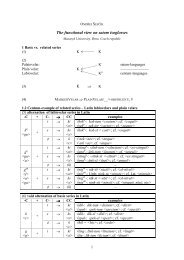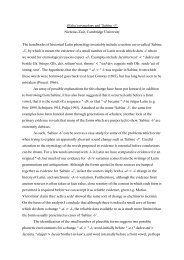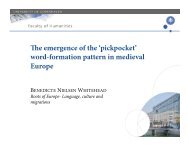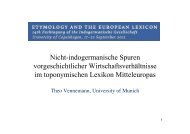Roots Deep in Heaven Indo-Iranian ritual concepts in a cross ...
Roots Deep in Heaven Indo-Iranian ritual concepts in a cross ...
Roots Deep in Heaven Indo-Iranian ritual concepts in a cross ...
Create successful ePaper yourself
Turn your PDF publications into a flip-book with our unique Google optimized e-Paper software.
Velizar Sadovski, <strong>Indo</strong>-<strong>Iranian</strong> <strong>ritual</strong> <strong>concepts</strong> <strong>in</strong> a <strong>cross</strong>-cultural perspective, 18.09.2012 5<br />
7.3. On (Greek) b<strong>in</strong>d<strong>in</strong>g spells aga<strong>in</strong>st competitors s. Chr. FARAONE, ‘The Agonic Context of Early Greek<br />
B<strong>in</strong>d<strong>in</strong>g Spells’, <strong>in</strong>: Chr. A. FARAONE / D. OBRINK (eds.), Magika Hiera, 1991, 3–32.<br />
● On form variation <strong>in</strong> the expressions of ‘BIND’ and ‘BONDS’ by us<strong>in</strong>g comb<strong>in</strong>ations of Cf. further on:<br />
8. Amatory spells:<br />
8.0. Erotic magic – φιλτρο-κατά-δεσμοι from whom to whom:<br />
(A.) Greek evidence: above all, men <strong>in</strong> pursuit of women, but also other casūs:<br />
1. women <strong>in</strong> pursuit of men: PGM XV, XVI, XIXb, XXXIX; DT 100, 230; GAGER no. 18.<br />
2. women <strong>in</strong> pursuit of women: PGM XXXII; Jordan, ‘A Survey of Greek Defixiones…’ [SGD], Greek,<br />
Roman and Byzant<strong>in</strong>e Studies 26, 1985, 151;<br />
3. men <strong>in</strong> pursuit of men: PGM XXXIIa; GAGER no. 25 ? ;<br />
4. recipes to deliver men or women; PGM I, l<strong>in</strong>e 98; IV, l<strong>in</strong>e 2089; and GAGER no. 31.<br />
(B.) Indian evidence:<br />
1. men <strong>in</strong> pursuit of women: e.g., AVŚ. 2,30; 6,8; 6,77; 6,89 etc. etc.<br />
2. women <strong>in</strong> pursuit of men: e.g., AVŚ. 6,130; 6,130; 6,60; 6,132...<br />
8.1. B<strong>in</strong>d<strong>in</strong>g <strong>in</strong> amatory spells:<br />
8.1.1. Greek tradition – almost always, (κατα-)δέω; also, κατ-έχω (Κάτ-οχος), on tablets: κατα-γράφω<br />
● (GUARDUCCI, Epigrafia greca IV; GAGER 158f.): I record (κατα-γράφω) Isias, the daughter of Autoclea, with<br />
Hermes the Restra<strong>in</strong>er. Restra<strong>in</strong> her near you. I b<strong>in</strong>d (κατα-δέω) Isias before Hermes the Restra<strong>in</strong>er (Κατοχος)<br />
— the hands, the feet of Isias, the whole body.<br />
● Rich <strong>in</strong> spells for revenge for love rejection, cf. VERSNEL, Fs. Burkert, WINKLER, The constra<strong>in</strong>ts of Desire.<br />
8.1.2. Indian – e.g., ápi + dyati:<br />
● A pair of b<strong>in</strong>d<strong>in</strong>g-and-unb<strong>in</strong>d hymns – AVŚ. 6,138: to make the beloved (!) man impotent, and 4,4: to give<br />
him his potency back, if he rema<strong>in</strong>s bound to the curser (!).<br />
● AVŚ. 4,37,7:<br />
ānr̥ ́tyataḥ śikhaṇḍíno<br />
gandharvásyāpsarāpatéḥ |<br />
bh<strong>in</strong>ádmi muṣkā́ uv ápi + WL 1,212 (cf. also R. SENEVIRATNE, <strong>in</strong> prep.):<br />
7. Of the hither-danc<strong>in</strong>g, crested<br />
Gandharva, Apsaras-lord,<br />
dyāmi śépaḥ ||7||<br />
I split the testicles, I b<strong>in</strong>d fast (?) the member.<br />
8.2. Seiz<strong>in</strong>g the m<strong>in</strong>d and senses of the ‘beloved’ person – aga<strong>in</strong>, just like <strong>in</strong> hymns aga<strong>in</strong>st enemies:<br />
● AVŚ. 3,25,3–6: erotic spell.<br />
● AVŚ. 6,94,2 – ‘defixio hostilis’ (GRABH i ):<br />
aháṃ gr̥ bhṇāmi mánasā mánāṃsi<br />
2. I seize [your] m<strong>in</strong>ds with [my] m<strong>in</strong>d;<br />
máma cittám ánu cittébhir éta |<br />
come after my <strong>in</strong>tent with [your] <strong>in</strong>tents;<br />
máma váśeṣu hr̥ ́dayāni vaḥ kr̥ ṇomi<br />
I put your hearts <strong>in</strong> my control;<br />
máma yātám ánuvartmāna éta ||2||<br />
come with [your] tracks follow<strong>in</strong>g my motion (WL).<br />
8.3. “Corporeal b<strong>in</strong>d<strong>in</strong>g”: lists of body parts <strong>in</strong> amatory spells (ā ́ + DĀ1; GRABH i ):<br />
AVP. 2,35,3–4<br />
yathā surā yathā madhu<br />
yathākṣā adhidevane |<br />
yathā ha gavyato mana<br />
evā mām abhi te manaḥ ||3||<br />
ā te padaṃ padenādiṣy<br />
ā te manasā manaḥ |<br />
pratyañcam agrabhaṃ tvā-<br />
-aśvam ivāśvābhidhānyā ||4||<br />
Like the Surā, like(/and) the honey (belong together)<br />
like the dice (aim) at the play<strong>in</strong>g board,<br />
like the thought of a desirous (man),<br />
so (let) your thought (aim) at me.<br />
Your footpr<strong>in</strong>t has been taken by (a / my) footpr<strong>in</strong>t,<br />
your thought has been taken by (a / my) thought,<br />
I seized you as one turned to me (/ “frontally”),<br />
as a horse by the horse-halter.<br />
8.4. Further φιλτρο-κατά-δεσμοι – erotic(iz<strong>in</strong>g) prayers, amulets, pharmaka, technologies:<br />
● Greek: J. J. W<strong>in</strong>kler, ‘The constra<strong>in</strong>ts of Eros’, <strong>in</strong>: FARAONE – OBBINK (eds.), Magika Hiera, 220ff.<br />
● Indian evidence: BLOOMFIELD, AV.; J. MODI, Amulets.<br />
8.5. Separation curse, Trennungszauber:<br />
● Indian evidence: e.g., AVP. 2,58 – Separation of a woman from a man:<br />
vi vāṃ yantu hr̥ dayāni<br />
vi cittāni manāṃsi ca |<br />
atho yat tanvoḥ saṃgataṃ<br />
tad vām astu vidūrakam ||5||<br />
asti vai vāṃ viduvikam<br />
ubhau śayane antarā |<br />
viṣvañcau pary ā vartethāṃ<br />
yathā vāṃ na sahāsati ||6||<br />
5. The hearts of you two shall go asunder/apart, asunder/<br />
apart the <strong>in</strong>tentions and the thoughts; and then that<br />
of the two bodies which has been united, that of you<br />
may be wide asunder/apart.<br />
6. (Now) there is a separation <strong>in</strong> bed between you two:<br />
turn (‘yourself’) <strong>in</strong> different directions, so that there will<br />
be no (more) together(ness) (ZEHNDER 130–134; cf. ibid.<br />
comm. J. HOUBEN: deconstruction of the last verse of the<br />
RV, <strong>in</strong> the hymn about harmony [E<strong>in</strong>trachtslied], to disharmony!).<br />
● Greek evidence: separation of a woman from a man (and vice cersa); separation of two men.<br />
– Separation of a woman from a man:









